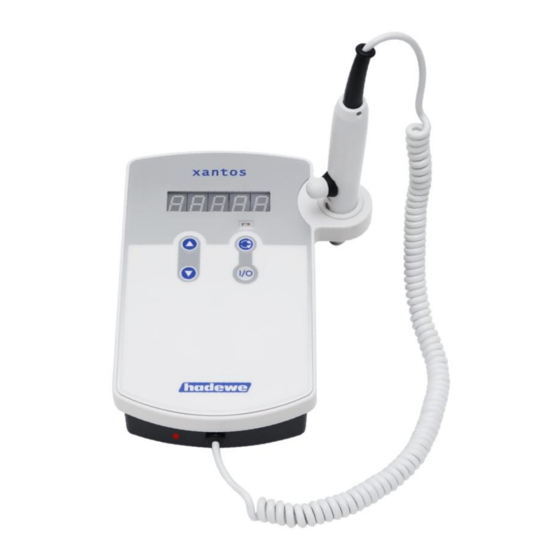
Table of Contents
Advertisement
Quick Links
Advertisement
Table of Contents

Summary of Contents for hadewe Xantos-BT
- Page 1 Manual Battery Drill Xantos-BT (Art. No. 0842) FB 04-238 Rev. 3 Art. no. 0842...
-
Page 2: Table Of Contents
Contents Safety instructions Cleaning & Disinfection Getting to know the unit Before the use Area of application Place of installation Before the first use Maintenance & Care Accumulators Accumulator running time Charging display Charging process Warning LED Warning signal (acoustic) Changing the accumulators 13 Clamping the bur/ tool Adjusting the speed... -
Page 3: Safety Instructions
Safety instructions Read this instruction manual in its entirety before you start operating the unit. Especially read through any information regarding the battery and recharging process to prevent damage to the accumulators. The equipment should only be used bytrained operators. The installation of the working area has to correspond to the relevant regulations. - Page 4 Safety instructions When working with materials, which might create dust or moisture, use a drilling unit with suction or spray technique. Wear a nose and mouth protection. Always follow the safety instructions, provided by the manufacturer of the materials being formed and used. For safety reasons wear goggles during the treatment.
- Page 5 Warning: Electric shock may occur. Only work with recharging units recommended by hadewe. Charging units of other manufacturers may use a power output, which might be too hight, and would lead to damage the unit, or even cause it to burn.
- Page 6 To prevent any possible safety risks make sure you always use only original hadewe accumulators. Never disassemble the accumulators in any way. In case the unit was exposed to impact of any kind, it had to be checked, that the accumulators have not sustained damage.
- Page 7 Safety instructions Damaged Accumulators: A damaged accumulator can be identified by: damaged or deformed housing of the accumulator tarnished spots on the metal parts of the batteries melting points heating accumulators when the unit is switched off ...
- Page 8 Safety instructions Attention: Important Notice Regarding the Transport of this Unit. For transport and shipping of the unit you have to make sure that the transport safety device at the side of the unit is switched off. This is very important, since it will prevent an accidental activation of the unit during transport.
-
Page 9: Cleaning & Disinfection
Safety instructions Cleaning and disinfection After every treatment please carry out the following steps: Remove the rotating tool (e.g. bur, capper, etc.) first. Then handle the cleaning of the tool according to the instructions of it`s manufacturer. Remove tissue remains by wiping off the unit with a mildly moistened paper cloth. -
Page 10: Getting To Know The Unit
Getting to know the unit 1 Display of speed and battery charge 2 LED: ON during reverse rotation 3 Increase the speed (up) 4 Decrease the speed (down) 5 Change direction of rotation 6 Switching the unit ON/OFF 7 Warning LED if battery charge is too low 8 Transport safety switch... -
Page 11: Before The Use
Before the use Please read through the instructions carefully before using the unit and carefully note the safety advice. Always keep this manual accessible to any users of the drill. Area of application The control unit can be set up in a cabinet, or can be used as a portable unit (e.g. -
Page 12: Before The First Use
Before the use Fully charge the unit before its first use. Read the instructions in the following chapter proceed. Before first use Before the first start you have to turn the main switch from 0 to 1 with a coin or a screwdriver. Because of safety reasons you have to turn the transport safety switch from 1 to 0 for longer... -
Page 13: Maintenance & Care
You Only use charging device, which will now have approximately 3 have been approved by hadewe. weeks to re-charge the unit to Never use any charging units, prevent cells... -
Page 14: Clamping The Bur/ Tool
Maintenance & Care Change accumulators The plug has to be removed from the connected charging unit. Switch the unit off, and make sure that the handpiece is secured in a way, where it cannot cause damage or injury in case of an unintended start of the drill. -
Page 15: Cleaning The Chuck
Maintenance & Care Set the tool 5300 on Cleaning the chuck the axle and hold it Because of the additional protection tight. Now use the washer (see right), not much dirt is front of tool 5343 to usually entering the handpiece. In unscrew the chuck. -
Page 16: Handling Details
Working with high pressure materials used will not improve the outcome hadewe prevent a formation of your work, since the motor of rust. In cases in which a will even be slowed down. A second rust infestation was found within the... -
Page 17: Troubleshooting
The bur/tool itself can be tested If a fuse is blown, let the fuse be with the hadewe Bur Shaft exchanged by a professional Tester (Art. No. 4990) to see, if it service point, following these is bent. - Page 18 Troubleshooting millisecond to check the voltage and initiate the warning signal in case deep discharge (accumulators being completely empty) being imminent. This switching on is accompanied by a silent clicking noise from the transistor.
-
Page 19: Technical Data
Disposal documents: For disposal of this unit, please contact the site, where you bought this hadewe 2014/30/EU directive EMC product. 2011/65/EU: ROHS DIN EN 60335-1: Household and similar Do not dispose in household refuse. electrical appliances - Safety - Part 1: Respect your local disposal regulations. - Page 20 GmbH Grambartstraße 10 30165 Hannover Germany info@hadewe.de www.hadewe.de...







Need help?
Do you have a question about the Xantos-BT and is the answer not in the manual?
Questions and answers